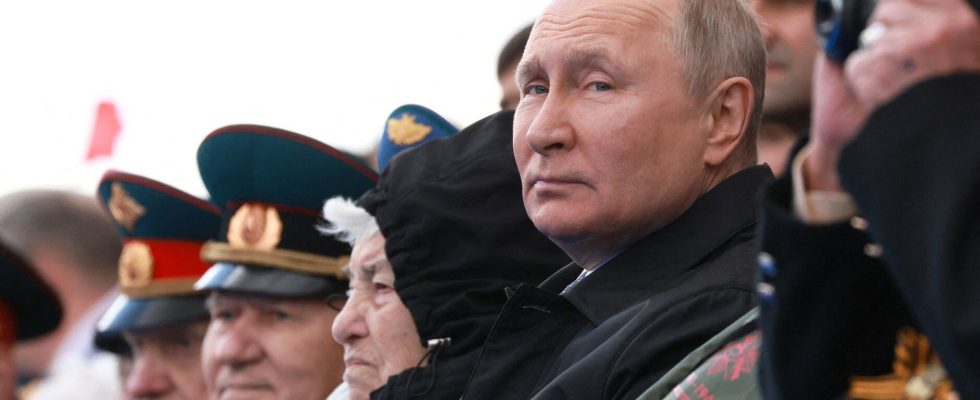1. Can Yevgeny Prigozhin take power?
And for the first time, he opposed the boss… On June 15, Yevgueni Prigojine committed an affront that could cost him dearly. On his Telegram account, the head of the Wagner group announced that he would prevent his men from contracting with the Russian Ministry of Defense – a measure which, in the end, would mean the dilution of his private army. “No mercenary is ready to take this path of shame,” he writes furiously, while pretending to ignore that the order comes directly from … Vladimir Putin. “It’s an unprecedented fact, says Roman Anin, Russian journalist in exile, co-founder of the media Important Stories. Until now, Prigojine attacked personalities like Ramzan Kadyrov, the president of Chechnya, or Sergei Shoigu, the Minister of Defense, whose incompetence he criticized, but never the head of the Kremlin!
However, the matter seemed settled: without Putin, Prigojine is nothing. “He would never have been able to recruit fighters from the prisons if the head of the Kremlin had not allowed it, recalls Tatiana Stanovaya, founder of the analysis firm R.Politik. And he also needs official institutions to continue his activities in Ukraine or Africa. He couldn’t survive without those ties. And if he became a threat to Putin, he would get rid of him.” Would Prigojine, despite everything, have decided to fly on his own? The assumption is not absurd. “Prigojine is a former prisoner, he has a very developed survival instinct. If he feels strong enough to ignore an order from Putin, it is because he has other high-placed support”, interprets historian Françoise Thomas. Prigozhin also knows that he is very useful to Putin in containing the influence of the generals and the Minister of Defense, which, if the war is prolonged, will take on increasing importance.
Still, to break into politics, he would need the support of the Russian elites, the very ones he would like, “to park in a stadium, surrounded by armed soldiers, as Pinochet did”. But he doesn’t. “Prigojine has an interest in continuing to serve Putin, judges historian Galia Ackerman. If the situation gets tough for the president, he could form his close guard and allow him to keep power through terror.”
2. Can Putin hold his own?
At 70, Vladimir Putin defies the statistics of male life expectancy in Russia (67 years) and does not seem in a hurry to retire. Can the course of the war in Ukraine upset its destiny? “A military defeat will not necessarily cause its downfall, tempers Anna Colin-Lebedev, lecturer at Paris Nanterre University, a specialist in post-Soviet societies. Its future depends on its ability to curb the many negative effects of the conflict: it seeks at all costs to maintain the illusion that everything is under control.”
Problem, the oil and gas bonanza, redistributed to buy social peace, risks shrinking under the effect of the Western embargo, even if China and India have partially taken over. Already, discontent would grow among the elites and within the regime. To the point of threatening him? “It is very difficult to know if a plot is in preparation, believes Galia Ackerman. Putin is someone very meticulous when it comes to his own protection: overthrowing him is a difficult task.”
As for finding a successor… “Nothing indicates that he is looking for one”, continues this specialist in the Russian world. Whatever the outcome of the war in Ukraine, the probability is strong that he will be elected again for the presidency of 2024. Unless by then…
3. What Russia after Putin?
“Putin knows that his only way to leave the Kremlin is with his feet first: either someone kills him or he dies,” says historian Sergey Radchenko. One thing is certain, a Russia without Putin will sooner or later come to pass. Some, in the circles of power, are already preparing for it. The first possible scenario is the most violent: a clan war for the throne, disastrous for the country. “Putin has played since his arrival in the Kremlin a sort of godfather role, which guarantees the balance between the various rival groups fighting for power, resources, access to the president”, explains journalist Roman Anin.
His departure would lead to clashes between suitors, having real armies, such as Evgueni Prigojine, Ramzan Kadyrov and Viktor Zolotov (the head of the national guard); or controlling security services, like Nikolai Patrushev. “These guys hate each other: if one clan wins, the others will have to obey it, or else they will lose everything, and perhaps including their freedom or their lives,” continues this fine connoisseur of the Kremlin. “One can imagine a criminal battle for the control of hydrocarbons, goods, factories…”, adds the writer Mikhaïl Chichkine. A modern version of the “time of troubles”, between 1598 and 1613, which threatened the very existence of the Russian state, between the end of the dynasty of the Riurikides (that of Ivan the terrible) and the Roumanovs.
Alternatively, the Putin regime continues, regardless of its creator. In this scenario, whether or not Russia retains the conquered territories in Ukraine, members of the elite agree to dismiss the Russian No. 1. For them, the war in Ukraine was a disaster: it impoverished them and cut them off from the world. “The fundamental principles of this regime: a ruling group, which monopolizes oil and gas wealth and uses it to control domestic politics and project its power abroad, can very well survive Putin”, underlines the historian Francoise Thomas. The new team would approach European leaders and give them pledges by releasing emblematic political prisoners, such as Alexeï Navalny, in order to trigger the lifting of sanctions and the resumption of business. “The autocratic nature of the regime would remain intact, behind a façade of Potemkin democracy,” continues the specialist. The new leaders would have understood that there is no point in intimidating the West, better to try to corrupt its leaders, like in the good old days…
